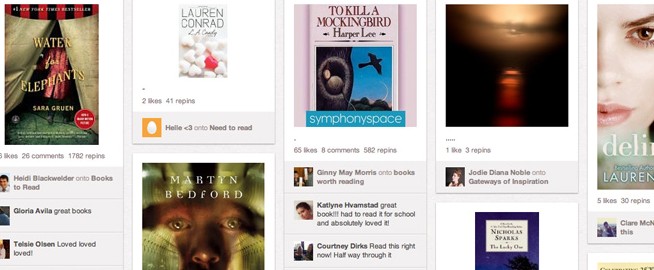 I like books. I like buying, borrowing, reading books. I’m fine staining books with coffee, tears, and sometimes blood. But I also love storing books in a way that ensure they’re both safe and strategically displayed for visitors to see. At Pinterest, I can fulfill a good range of these relationships I love to have with books. I can collect books and display them. But I can also collect images of gorgeous personal libraries with quaint book cases and stylish furniture. In general, Pinterest lets you collect and share images of almost anything.
I like books. I like buying, borrowing, reading books. I’m fine staining books with coffee, tears, and sometimes blood. But I also love storing books in a way that ensure they’re both safe and strategically displayed for visitors to see. At Pinterest, I can fulfill a good range of these relationships I love to have with books. I can collect books and display them. But I can also collect images of gorgeous personal libraries with quaint book cases and stylish furniture. In general, Pinterest lets you collect and share images of almost anything.
Pinterest is another social media success story. It’s essentially virtual collecting. So you like collecting things–photographs, flowers, wedding dresses, wedding cakes, postcards, DIY projects, and so on. Now you can do it from the comfort of your computer and display your collection on an imaginary corkboard. Think Facebook walls for images. Your display along with millions of others create visually compelling collages of images. Pinterest has had a near miraculous rise to fame. It’s been around since 2009 and remained pretty much unknown. But between July 2011 to January 2012, visits to Pinterest went from 1 to 11million per month.
It’s hard to say whether Pinterest is here to stay. But like the other social media platforms, Pinterest has its addicts. And apparently some people are bothered that these addicts are women. In the US, 83 percent of Pinterest users are women. The press has repeatedly referred to what some see as a shortcoming of the social media platform: The NPR headline on the feminine bent of the website goes: So Pinterest is a Woman’s World. Does That Really Matter? GIZMODO: Pinterest is Tumblr for Ladiez. TIMES MAGAZINE: Men are from Google+, Women are from Pinterest. WASHINGTON POST: Digital Crack for Women. THE SALON: Pinterest’s Gender Trouble.
But why do people get worried when women dominate a form of media? Novels too have recently been the object of a a similar anxiety. American novelist, Jonathan Franzen, and other male authors have said that they are concerned that men don’t read novels anymore and that novel reading has been hijacked by soccer moms and Oprah, the patron saint of women’s book clubs.
image via









COMMENTS -
Reader Interactions